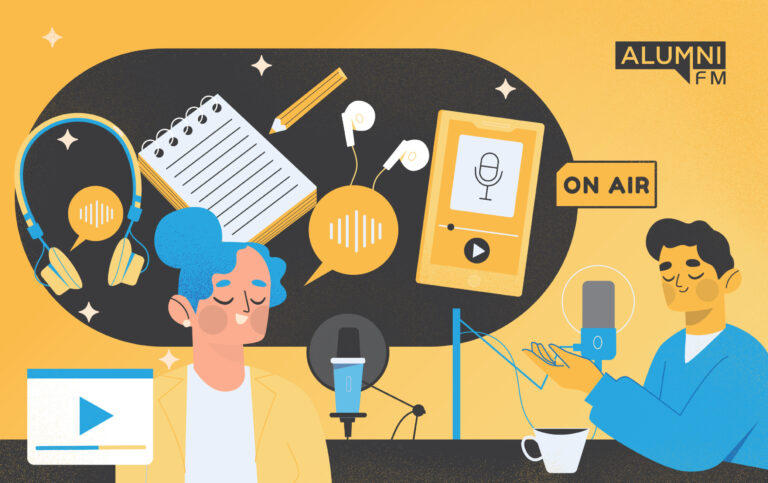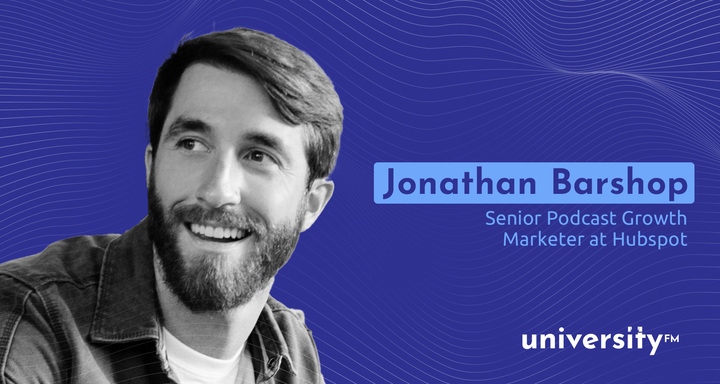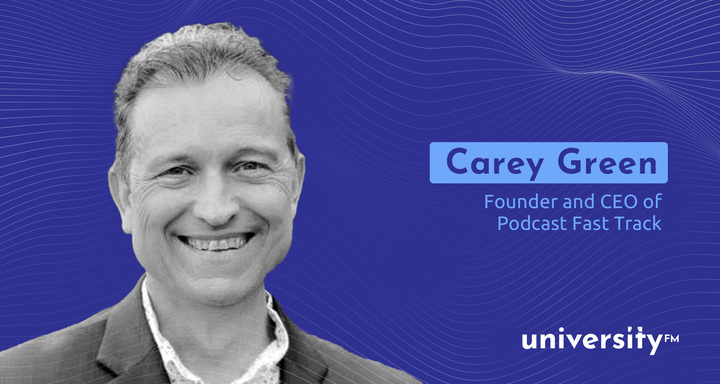
Great content fills a need and piques your curiosity. It’s about answering your audience’s questions by having interesting and exciting conversations. This is why podcasts work so well, especially when you want to engage your audiences. It becomes a platform for your community to ask questions about your institution. People who listen to your podcasts have different interests and priorities. How can you reach each one of them? How can you make sure every episode is valuable to your listeners?
In this article, we’ll help you understand the pain points of the people in your community and how you can plan for your podcast. We’ll cover how you can make each episode relatable to everyone in your organization, from prospective students to alumni and donors.
Podcast Ideas for Prospective Students
Incoming college students are worried about preparing for the admissions process. They’re considering what course to take, filling out their application, writing their essay, finding scholarship options, and considering what degree to pursue. How can you explain your admissions process in a simple and helpful way?
Learn from the team at Yale
In response to the “Varsity Blues” scandal, the team at Yale was keen to provide a new level of transparency in the admissions process. The show Inside the Yale Admissions Office shares the complex and dynamic work inside the Yale Office of Undergraduate Admissions. It gives firsthand accounts of the application screening and how they make decisions within the Admissions Committee and collaborate with other offices and resource centers.
Why the show works
The show gives an insider look into shortlisting applications, offering helpful tips for aspiring students. The podcast helps build confidence in the fairness of the process by taking listeners through application readings, committee meetings, discussions about application essays, etc.
Like Yale, you can use your show to build trust. Go beyond making a great first impression by making this process familiar and easy.
Podcast Ideas for Current Students
One of the best ways to get current students to listen to your show is to listen to them first.
Collaboration between students, peers, faculty, school administration, alumni, and donors is essential to community-building. It’s important to provide students with a platform where they feel like they’re part of the community. They need to be heard and talk about the things that matter to them and their friends.
Learn from the team at Bowdoin
The Bowdoin College community is committed to supporting U.N.’s Sustainable Development Goals. The campus has always been mindful of its impact on the environment of coastal Maine. And this is why the Green Tea podcast was created in 2019 by sustainability student employees Diego Velasquez and Marie Caspard. The duo wanted to tell stories about sustainability from the perspective of faculty, staff, students, and community members.
Why the show works
The show is brilliant in getting everyone on board, from students to faculty and even marine patrol officers from Maine! They do it without forgetting the campus’ sustainability culture, especially during the hybrid school setup. Even if the show is about environmental awareness, it features all aspects of university life.
Learn from the team at Bowling Green University
The community at BGSU values big ideas for the public good. When they launched the podcast BG Ideas, they wanted listeners to learn more about the amazing work in and around the university to help address social and cultural problems. The podcast is produced by the Institute for Culture and Society (ICS) and the School of Media and Communication. Each episode features conversations about timely issues like Food Security Gap, Supporting the Latin Community, and Tackling Anti-immigrant Rhetoric. Everything is researched, written, edited, and edited by students.
Why the show works
Jolie Sheffer, podcast host and associate professor at BGSU, talks to academics, artists, activists, and other professionals about the outstanding interdisciplinary work being done in and around the university to help address social problems for the public good. The podcast is an interdepartmental project, allowing collaboration between students, faculty, and school administration. It’s also a great way to reflect the university’s culture and values.
Your platform is an excellent way to discuss the things that affect your students’ lives. Use the show as an opportunity to build a sense of community and collaboration among your audience.
Podcast Ideas for Alumni
Lifelong learning opportunities for different life stages matter most to your alumni. They look for career resources and connections. Alumni surveys rank career support as the most essential service. How can you contribute to your life goals and growth?
Learn from the team at the University of York
The Careers and Placement Department’s ultimate goal is to support students during and after their time on campus with building their future. Their podcast, What do you actually do? (now on its 9th season), does a remarkable job of giving alumni insight to what their peers are doing.
Every single episode includes these two questions:
- What do you do all day?
- What skills do you need to get this job?
It’s a simple but effective format that allows your graduates to get to know people from the same industry.
Why the show works
It gives students and new graduates career inspiration, top tips, and insider knowledge every other week as the guest tries to answer, ‘What do you actually do?’ Each episode is accompanied by useful links to help them research the industry and job and a blog post with a full show transcript.
Plan for a Personalized Listening Experience
Students—current and graduates who listen to your show are at different stages of their lives. Learning about their pain points will help you connect with them. Ultimately, listen to institutions they trust and believe in.
Planning your show’s content?
Download this podcast content planning guide for more ideas!
What this means for your podcast
Tell personal stories that are helpful. Tap into the relatable elements of your podcast.
True Crime Resonate
Young audiences find true crimes to be immersive because of its storytelling format. To them, it’s like the campfire stories, minus the actual camp.

Why it works
Most fans rave about how the show is well-researched and often enlightening. It has a mellow pace and provides an investigative journalism take that makes the show sound like This American Life, but for True Crime.
Check this episode:
What this means for your podcast?
High production value and immersive audio storytelling elements create an immersive experience. Consider adding in music and audio clips for a better listening experience.
Planning your show’s content?




